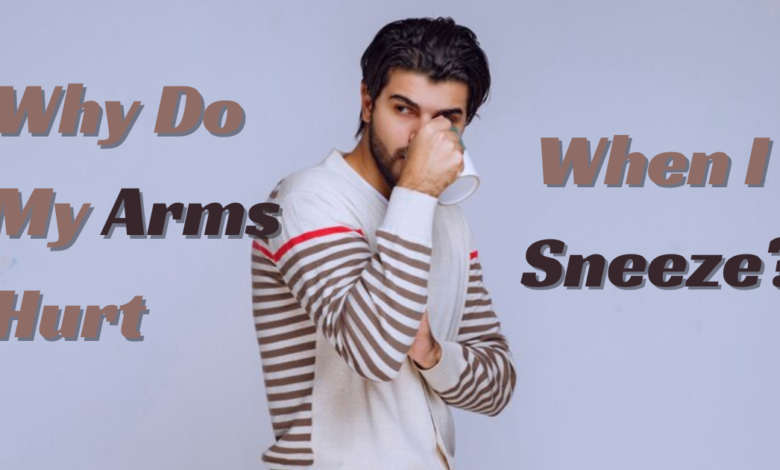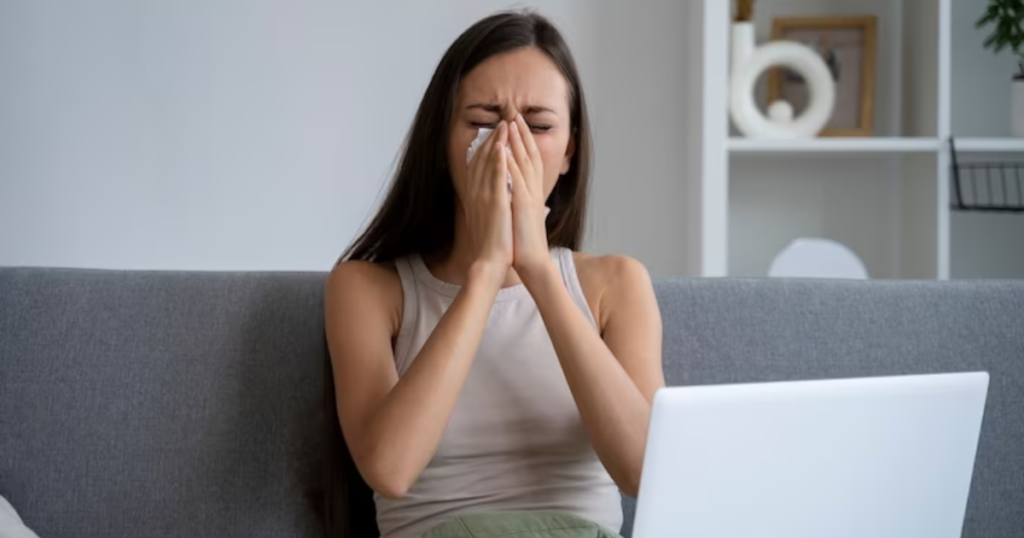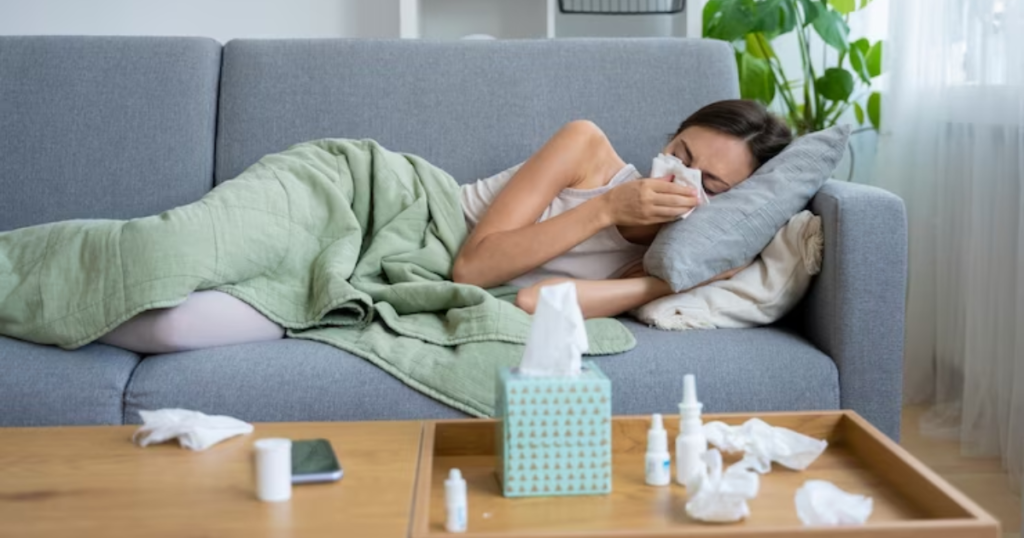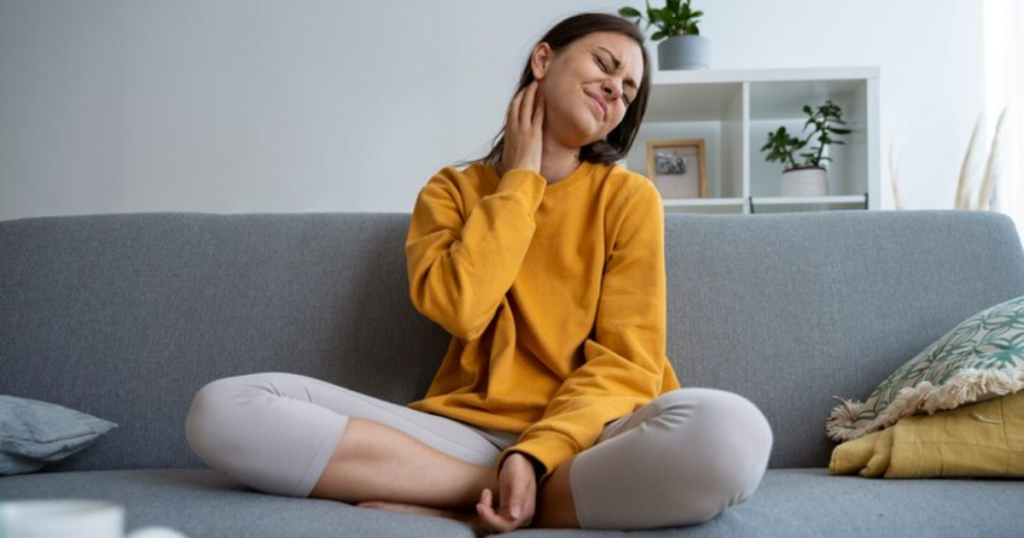Why Do My Arms Hurt When I Sneeze? Reasons, Recovery

If you’ve ever had a serious hurt in your arms when sneezing, you’re not alone. This unusual feeling frequently catches people off guard, leaving them wondering about its true causes. Let’s look at the physics of the issue “Arms Hurt When Sneeze” and how to reduce the discomfort.
Why Do We Sneeze?
Sneezing is a normal reflex that helps the body eliminate irritants or foreign particles from the nasal passages. When something irritates the nasal lining, such as dust, pollen, smoke, or other irritants, the body responds by causing a sneeze.
Sneezing begins with irritation stimulating nerves inside the nose, which send a signal to the brain. The brain then sends instructions to the muscles that control the sneeze reflex, which includes the chest, belly, and diaphragm. These muscles contract rapidly, causing air to be expelled from the lungs through the nose and mouth.
The strong release of air helps to eliminate the irritant from the nasal passages, resulting in temporary relief from the inflammation. Sneezing also protects the respiratory system by eliminating potentially hazardous compounds before they reach the lungs.
Types of Pain After Sneezing
Some people may suffer different sorts of pain after sneezing, depending on the severity of the sneeze, underlying health issues, and individual sensitivity. The following are some frequent types of pain that might develop after sneezing:
- Muscle strain: Sneezing activates many muscles in the body, including those in the chest, belly, back, and neck. In some situations, especially if the sneeze is forceful or the person has weak muscles, it might cause muscle tension or soreness in these locations.
- Headache: A headache can sometimes result from the abrupt and powerful ejection of air during a sneeze, especially if the pressure changes rapidly in the sinuses or blood vessels. Individuals with migraines or tension headaches may be more likely to get headaches after sneezing.
- Neck pain: The fast and forceful movement of the head and neck during a sneeze can occasionally cause neck pain, especially if the neck muscles are stiff or strained.
- Sinus pain: If the sinuses are already irritated or congested from allergies, colds, or sinusitis, the pressure changes caused by sneezing can increase sinus pain or discomfort.
- Chest pain: Sneezing hard can induce transient chest pain, particularly in people who have costochondritis (inflammation of the cartilage that joins the ribs to the breastbone) or sternum fractures.
- Abdominal pain: Sneezing can occasionally induce mild stomach pain or cramping, especially if the abdominal muscles are weak or the person has gastrointestinal problems such as irritable bowel syndrome (IBS).

Common Reasons for Arm Pain During Sneezing
1. Muscle Strain
One of the primary reasons for experiencing arm pain during sneezing is muscle strain. When you sneeze, the sudden and forceful contraction of muscles, particularly in the abdomen and chest, can transmit strain to the arms, especially if they are not adequately supported. Individuals who engage in repetitive arm movements or have poor posture may be more susceptible to muscle strain during sneezing.
2. Nerve Compression
Another typical reason for arms hurt when sneeze is nerve compression. The powerful expulsion of air during a sneeze can put pressure on nerves in the arms, causing pain or discomfort. Nerve compression can result from a variety of circumstances, including underlying medical diseases such as cervical spine problems or repetitive stress injuries.
3. Joint Inflammation
Joint inflammation, such as in the shoulder or elbow, might cause arm pain while sneezing. Arthritis and bursitis can create inflammation and stiffness in the joints, worsening pain when unexpected movements, such as sneezing, occur. Individuals with pre-existing joint difficulties may experience increased sensitivity during sneeze bouts.
4. Thoracic Outlet Syndrome
Thoracic outlet syndrome (TOS) is defined by nerve or blood vessel compression in the thoracic outlet, which is located between the collarbone and the first rib. Sneezing might worsen TOS symptoms, such as arm pain, numbness, or tingling. Individuals with TOS may suffer significant discomfort when performing tasks that require raising their arms or making quick movements.
5. Intercostal Muscle Strain
The intercostal muscles, which are positioned between the ribs, play an important part in breathing and chest expansion. Sneezing can cause intense or shooting pain in the arms if these muscles are strained or injured, as the powerful contraction of the chest muscles puts additional strain on the intercostal muscles.

Preventing Arm Pain When Sneezing
1. Strengthening Core Muscles
Strengthening the core muscles might help support the upper body during sneezing. When the core is strong, the force of the sneeze is spread more evenly throughout the body, putting less strain on the arms.
Tips for Strengthening Core Muscles:
- Include exercises like planks, crunches, and Russian twists in your fitness routine.
- Yoga and Pilates can help you strengthen your core stability and flexibility.
- Maintain appropriate posture throughout the day to fully utilize your core muscles.
2. Improving Posture
Poor posture can cause arm pain while sneezing by putting additional strain on muscles and joints. Maintaining good posture ensures optimal spinal alignment and lowers the chance of damage during unexpected movements such as sneezing.
Tips for Improving Posture:
- Sit or stand tall, with shoulders back and relaxed.
- Keep your chin parallel to the ground and prevent slouching.
- Ergonomic furniture and accessories can help you maintain a healthy posture when working or sitting for lengthy periods.
3. Practicing Relaxation Techniques
Stress and tension might aggravate arm pain during sneeze fits. Incorporating relaxation techniques into your everyday practice can help relieve muscle tension and improve overall health.
Tips for Relaxation:
- Deep breathing exercises can help alleviate stress and muscle strain.
- Try meditation or mindfulness practices to relax your mind and body.
- Plan regular pauses throughout the day to rest and refuel.
4. Avoiding Repetitive Movements
Repetitive actions can strain the muscles and joints, increasing the possibility of arm pain while sneezing. Reducing repetitive actions and adding variation to everyday tasks might help prevent overuse injuries.
Tips for Avoiding Repetitive Movements:
- Take frequent breaks to stretch and change postures when performing repetitive chores.
- Reduce arm and shoulder strain by using ergonomic tools and equipment.
- To avoid overstressing specific muscle groups, alternate between diverse activities.
5. Seeking Medical Evaluation
If arm pain when sneezing persists or worsens despite preventive measures, seek medical attention. A medical professional can evaluate your symptoms, diagnose any underlying disorders, and suggest relevant treatments.
When to See a Doctor:
- persistent or severe arm ache while sneezing.
- Numbness or tingling in the arms or hands.
- Difficulty carrying out everyday activities owing to arm discomfort

How to Manage Sneezing Pain?
Managing sneeze pain might be difficult, but there are numerous ways you can do to decrease discomfort:
- Avoid Triggers: Identify and avoid any factors that may cause sneezing, such as pollen, dust, pet dander, or strong scents.
- Maintain Cleanliness: Keeping your living area clean will limit your exposure to allergens and irritants. To reduce airborne particles, and dust, vacuum, and change your air filters regularly.
- Use a Nasal Spray: Over-the-counter saline nasal sprays can assist in moisturizing nasal passages and relieve inflammation, lowering the frequency of sneezes.
- Stay Hydrated: Drink plenty of water to keep your nasal passages hydrated, which can assist with irritation and sneezing.
- Use a Humidifier: A humidifier in your house can offer moisture to the air, avoiding dryness in your nasal passages and perhaps reducing sneezing.
- Take Over-the-Counter medication: Antihistamines, decongestants, and other over-the-counter drugs can help relieve sneezing pain by lowering inflammation and suppressing the desire to sneeze. However, before taking any medicine, consult with a healthcare practitioner, especially if you have underlying medical conditions or are currently taking another prescription.
- Try Nasal Irrigation: A saline nasal rinse or neti pot can help wash irritants and allergens from your nasal passages, reducing sneezing and suffering.
- Apply Warm Compresses: Warm compresses can help relieve nasal pain and discomfort caused by sneezing.
- Use Relaxation Techniques: Stress and worry can worsen sneezing. Deep breathing, meditation, and yoga are all relaxing strategies that can help reduce tension and relieve sneezing pain.
Other Areas That Can Hurt When You Sneeze
1. Back Pain
Sneezing can cause back pain, which is an unexpected side effect. When you sneeze, the force applied to your spine can strain the muscles and ligaments in your back, especially if you are predisposed to back problems.
This unexpected shock might exacerbate current problems or possibly cause new ones to emerge. To reduce the possibility of discomfort, sneezing should be done with proper posture and support for the spine.
2. Neck Strain
Sneezing, like back pain, can strain the neck muscles. The rapid and abrupt movement of your head can cause stiffness or soreness, especially if you tend to stiffen up while sneezing. To avoid neck strain, keep your neck relaxed and avoid jerking your head forward when you sense a sneeze approaching.

3. Abdominal Discomfort
Have you ever felt some sort of stomach hurt after sneezing? This sensation is not uncommon, particularly among those who have weak abdominal muscles or underlying disorders like hernias.
The power of a sneeze can exert pressure on the abdominal wall, causing pain or even harm in certain situations. Strengthening your core muscles with activities like planks and crunches will help reduce this risk.
4. Eye Strain
Believe it or not, sneezing can harm your eyes. Rapid ejection of air can cause your eyelids to flutter, causing tension or tiredness in the muscles around your eyes. Furthermore, sneezing with your eyes open has a low risk of damaging the delicate tissues of the eye.
While uncommon, some persons may have a condition known as “sneeze syncope,” in which sneezing causes a brief loss of consciousness due to a sudden increase in pressure within the chest cavity.
5. Jaw Tension
Sneezing can also affect the jaw. The power of the sneeze might cause the muscles in your jaw to tense strongly, causing tension or discomfort. This is especially true for people who clench their teeth while sneezing, which can worsen symptoms of temporomandibular joint (TMJ) disease.
More to Read: Why Do We Feel Pain In Muscles After Vigorous Exercise?
Conclusion
Arm pain after sneezing can be uncomfortable, but recognizing the underlying reasons and following preventive actions can help ease symptoms and improve overall health.
Individuals can effectively manage and prevent arm pain during sneezing episodes by implementing strengthening exercises, using proper sneeze techniques, and seeking medical guidance as needed.
Frequently Asked Questions
Why do my arms hurt when I sneeze?
When you sneeze hard, it might create a sudden increase in pressure inside your chest. This pressure may stress the nerves in your chest, causing your arms to pain for a brief while. It’s sort of like a humorous side effect of a large sneeze!
Is it normal for my arms to hurt when I sneeze?
Yes, it is quite normal! It may feel unusual, but as long as the pain subsides quickly, there is usually nothing to worry about. It’s simply your body responding to the force of your sneeze.
How can I stop my arms to hurt when I sneeze?
You can’t truly stop it from happening, but you can try to make your sneezes less forceful. Try sneezing while covering your mouth and nose with a tissue or your elbow. That may help relieve the pressure and make your arms less painful.
Should I see a doctor if my arms hurt when I sneeze?
Usually, you don’t need to see a doctor about this. However, if the discomfort in your arms lasts for a long time or is particularly severe, it may be prudent to consult with a grown-up. They can help determine whether there is something more serious going on.
Can anything else cause my arms to hurt when I sneeze?
Sneezing can cause minor muscular and nerve tension, although it is usually not a cause for concern. However, if you’ve recently injured your arms or have other health difficulties, such as a nasty cough or a cold, sneezing may cause your arms to pain much more. Don’t worry, it’s generally only temporary!





Hello Neat post Theres an issue together with your site in internet explorer would check this IE still is the marketplace chief and a large element of other folks will leave out your magnificent writing due to this problem
Hi my loved one I wish to say that this post is amazing nice written and include approximately all vital infos Id like to peer more posts like this
Your posts always provide me with a new perspective and encourage me to look at things differently Thank you for broadening my horizons
Your posts always provide me with a new perspective and encourage me to look at things differently Thank you for broadening my horizons
Your posts always provide me with a new perspective and encourage me to look at things differently Thank you for broadening my horizons
Your posts always provide me with a new perspective and encourage me to look at things differently Thank you for broadening my horizons
Your posts are always so relevant and well-timed It’s like you have a sixth sense for what your readers need to hear
Thank you for addressing such an important topic in this post Your words are powerful and have the potential to make a real difference in the world
Axton Bell
Wow, this blogger is seriously impressive!
Thanks